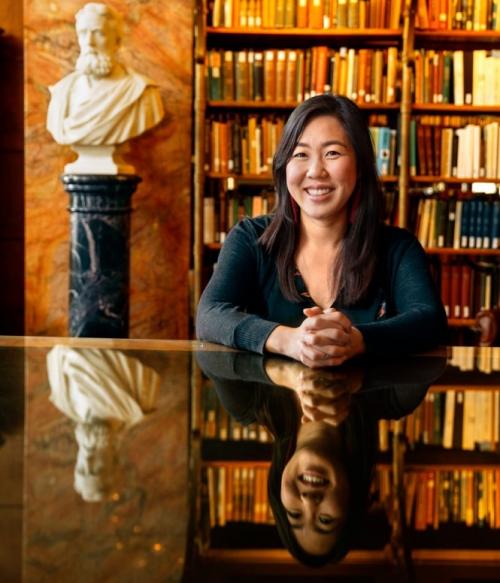When students first walk into Julia Chang’s classes, they often do a double take. “I don’t think students are accustomed to having a Korean-American Spanish professor,” says Chang, assistant professor of Hispanic studies in the College of Arts & Sciences’ Department of Romance Studies.
Her diverse research interests include gender and sexuality studies, medicine, and history and literature.
The 19th-century Spanish realist novels she’s analyzing for her first book, “Blood and Chastity: Narratives of Purity in Spanish Realism,” are massive – one weighs in at 1,500 pages – and they’re filled with concerns about bloodlines and sexual purity. In these novels, tainted blood lines, like marrying a seamstress or having a baby out of wedlock, can damn you forever in society. Chang is interested in realism’s fallen women, those caught in a bind between modern gender ideals and the persistence of blood-based social hierarchies.
Nineteenth-century Spain has surprising resonance for today, she says; for a new project, she’s exploring the roles that gender and disability played in Spanish colonialism and medicine. To the Spanish, soldiers were the highest expression of masculinity, because doctors verified the virility of conscripts as well as their physical beauty.
“Men who didn’t meet the requirements or who had to be discharged because they developed a disability were ‘useless,’” Chang says. “It sheds an interesting light on issues of gender and colonial history.”
Chang is part of a dual-career couple – her partner, Eli Friedman, teaches in the ILR School. “Cornell and ILR in particular went above and beyond to make it possible for me to be here; I’m very grateful,” she says.
As the child of immigrants, Chang understands what it feels like to be an outsider. She uses that empathy in her mentoring of first-generation and underprivileged students, an aspect of being a professor she loves. “They seek me out,” she explains. “The feeling of not fitting in helps me identify with them even if my story doesn’t match theirs.”
Chang also teaches as a core member of the Feminist, Gender and Sexuality Studies Program. Demand tripled the second time she taught the program's introductory course.
This story also appeared in the Cornell Chronicle.




